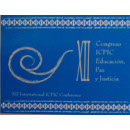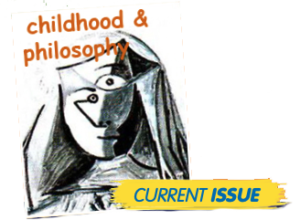Our Projects
Our Projects
We are committed to supporting initiatives
ICPIC is committed to supporting initiatives that focus on facilitating philosophical inquiry with young people. Our major projects include our biennial conference, our academic journal and our essay award competition. Going forward, we will focus on creating an ever evolving online platform to support P4wC initiatives and disseminate the extensive P4wC knowledge that has accumulated over the years. We are also working towards bringing P4wC to more underprivileged children and teens.
OUR
conference
Since its formation in 1985, ICPIC has held biennial international conferences that bring together advocates of philosophical inquiry with children from around the world. Over the years, we have endeavored to shift the conference location to different parts of the globe to encourage the greatest possible impact at the local and regional levels. Each conference is hosted by a different ICPIC member center in collaboration with the executive committee.
NEXT
ICPIC Gathering
2024 ICPIC Gathering & Annual General Meeting – Italy (Rome)
Dates: World Congress of Philosophy – August 1st to 8th, 2024. Location: ROME, ITALY.
ICPIC Pre-Meeting and Workshops – July 30th to 31st, 2024. Location: University of Naples “Federico II”, NAPLES, ITALY.
UNIVERSITY OF NAPLES “FEDERICO II” – DEPT. STUDI UMANISTICI, Via Porta di Massa, n.1 – Naples (Italy)
Please go to the Member’s Area Forums to see more details.
LINK TO MAP OF UNIVERSITY OF NAPLES
ICPIC Sessions – August 1st to 4th during the World Congress of Philosophy
The XXV World Congress of Philosophy (WCP), convening 1st / 8th August 2024 in Rome, Italy, includes thematic sessions relevant to Philosophy for/with Children. In particular, Session 81, “Philosophy with Children”, which is supposed to be scheduled in the first four days of the Programme, that is from 1st-4th August.
In consideration of the unfortunate loss of the Hamburg Conference scheduled for July 2024, the ICPIC Executive Committee (EC) recommends that ICPIC members take the XXV World Congress of Philosophy as an opportunity to share relevant scholarship. In addition, the ICPIC Executive Committee will convene an ICPIC General Meeting (AGM) during the WCP in Rome. However, it is important to note that the Philosophy with Children sessions at the WPC are not an ICPIC conference and are not intended to take the place of the conference planned for Hamburg.
Persons wanting to present a paper for the “Philosophy with Children” Session 81 at the WCP may submit proposals directly at the Congress website.
In addition to thematic sessions, the WCP invites proposals for panels/round tables (see link below). Persons wanting to propose a panel/round table may submit directly to the WCP website.
For those who are interested in presenting or participating in workshops and experiences, we will have the chance to do so at the Pre-Meeting, hosted by the University of Naples “Federico II”, on the 30th and 31st of July. More details will be released soon.
- In consideration of the fact that the PwC Session is co-chaired by ICPIC members and the current president, a process of negotiation to enlarge and facilitate participation in the meeting has been started by ICPIC EC. The WCP organizers positively agreed to offer a special low registration rate for ICPIC regular members to the whole WCP Programme. The registration procedure will be detailed in a specific communication. Considering these benefits, the EC invites ICPIC members to take part in the Rome event.
REGISTRATION: Special arrangements for ICPIC Members.
PLEASE LOGIN TO YOUR ICPIC MEMBERSHIP. THEN WATCH THIS VIDEO ON HOW TO ACCESS THE MEMBER’S ONLY FORUMS IN THE MEMBER’S AREA TO FIND MORE INFORMATION ABOUT REGISTRATION.
Link to Video instructions for accessing Member’s Forums
PRESENT A PAPER: Congress website – Submissions
PROPOSALS FOR ROUND TABLES: Instructions to submit proposals
ICPIC Pre-Meeting and Workshops – July 30th to 31st, 2024. Location: University of Naples “Federico II”, NAPLES, ITALY.
The meeting, hosted and organized by the colleague Maura Striano and Stefano Oliverio from University “Federico II” with the support of the Municipality of Naples, will be a precious opportunity of training in P4wC and for informal conversation among members before the ICPIC Gathering in Rome.
The scope and the main commitment of the meeting is the engagement of ICPIC members in workshops focused on Philosophy for Citizenship. The goal of the first day of work (July 30) will be involving the ICPIC convenors in the design of different proposals of P4wC “communities of philosophical inquiry” on the topic. The proposals elaborated in the workshops will be realized on the second day (July 31) involving citizens of all ages to live experiences of democracy of thinking together in various public places of the city.
The detailed program of the meeting will be available on the website soon.
The deadline for registration is June 30 2024.
The participation in the meeting is free for regular ICPIC members.
The participants must provide for themselves accommodation in Naples. A map of cheap locations available in the University area of the meeting will be provided on the website as soon as possible.
Past Conferences
Philosophy in and beyond the classroom:
P4C across cultural, social and political differences
The 20th Biennial International ICPIC Conference
Tokyo, Japan | Rikkyo University
Over the past four decades, Philosophy for/with Children (P4C, PwC: P4wC) has been practiced over 60 countries and regions and its number has been increasing dramatically. While large and growing literatures about P4wC tend to focus on children’s ethical and philosophical thinking in the classroom, in recent years we have been witnessing various forms of P4CwC practiced not only as a pedagogical tool but also social, cultural, religious, discursive and political practices in the classrooms, hospitals, orphan asylums, streets and/or museums. The current COVID19 situation also inevitably requires us to shift our understanding of “where P4wC occurs,” away from the confines of the classroom, toward the broader public sphere, including the digital space. As such, the various use of P4wC necessitates reconsideration of the role of philosophical dialogue in a complex and chaotic world, not just as a pedagogical practice but also as a complex practice encompassing educational, social, cultural, and political functions.
The ICPIC 2022 Tokyo (Japan) to be held in 8-10 August 2022 (pre-conference 5-6 August, Post Conference on August 11) will create an opportunity where all participants find new opportunities and challenges of philosophical inquiry with children from multiple angles. To this end, in organising the ICPIC Conference in 2022 in Japan, we strongly encourage philosophers, practitioners and teachers from, for example, Western, Asian, South-American, Middle-Eastern, African, Oceanian countries (and beyond) to participate in the conference and present their own practices so that we can open new avenues for thinking what P4wC is and ought to be. Plus, in the face of the global-scale challenges emerged as a result of the COVID19 pandemic, we also consider the future of philosophical dialogue by orchestrating knowledge and insights gained from various contexts.
For more information, click here.
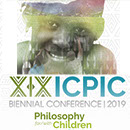 The 19th ICPIC conference entitled “Philosophy for/with Children and the Citizen Agent” took place in Bogotá, Colombia, in July 2019, in collaboration with Uniminuto de Dios University. It aimed to examine the P4wC program in relation to the ideal of the citizen-agent: one who understands citizenship not only as participation in social institutions, but also as a collaborative, critical activity to achieve a better society.
The 19th ICPIC conference entitled “Philosophy for/with Children and the Citizen Agent” took place in Bogotá, Colombia, in July 2019, in collaboration with Uniminuto de Dios University. It aimed to examine the P4wC program in relation to the ideal of the citizen-agent: one who understands citizenship not only as participation in social institutions, but also as a collaborative, critical activity to achieve a better society.
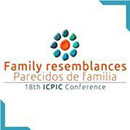 The 18th ICPIC conference entitled “Family Resemblances” took place in Madrid, Spain, in June 2017. It aimed to offer an open discussion around all the different approaches to philosophical inquiry with children in formal, non-formal and informal education. After nearly 50 years of engaging children, adolescents and adults in a Community of Philosophical Inquiry in various settings, a wide variety of methods and styles have been used that share some common features and family resemblances. This conference invited P4wC advocates and those working outside the framework to contribute ideas to the practice of philosophical dialogue.
The 18th ICPIC conference entitled “Family Resemblances” took place in Madrid, Spain, in June 2017. It aimed to offer an open discussion around all the different approaches to philosophical inquiry with children in formal, non-formal and informal education. After nearly 50 years of engaging children, adolescents and adults in a Community of Philosophical Inquiry in various settings, a wide variety of methods and styles have been used that share some common features and family resemblances. This conference invited P4wC advocates and those working outside the framework to contribute ideas to the practice of philosophical dialogue.
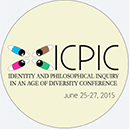 The 17th ICPIC conference entitled “Identity and Philosophical Inquiry in an Age of Diversity“ took place in Vancouver, Canada, in June 2015. It aimed to get a clearer picture of how to transform children’s vulnerability and disorientation regarding their increasingly multicultural, diverse, changing and ever more fragile environment so that they may learn to cultivate for themselves both compassion and agency. A central idea in ethical education has been the ideal of the self-sufficient, rational subject yet the ideals of democratic citizenship call for a more dialogically structured self in communication with diverse environments, as this conference explored.
The 17th ICPIC conference entitled “Identity and Philosophical Inquiry in an Age of Diversity“ took place in Vancouver, Canada, in June 2015. It aimed to get a clearer picture of how to transform children’s vulnerability and disorientation regarding their increasingly multicultural, diverse, changing and ever more fragile environment so that they may learn to cultivate for themselves both compassion and agency. A central idea in ethical education has been the ideal of the self-sufficient, rational subject yet the ideals of democratic citizenship call for a more dialogically structured self in communication with diverse environments, as this conference explored.
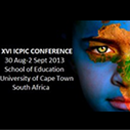 The 16th ICPIC conference entitled “Thinking and Reasoning in and beyond the Curriculum” in Cape Town, South Africa, was the first to be held on the African continent. It examined the theory and practice of Philosophy for/with Children in all phases of schooling as well in informal educational contexts. Questions included: How can philosophical perspectives benefit education? How can educational research contribute to teaching thinking and reasoning, particularly in the mainstream curriculum subjects, like information technology, literacy, mathematics, sciences, life skills, the arts, drama, citizenship, physical and moral education?
The 16th ICPIC conference entitled “Thinking and Reasoning in and beyond the Curriculum” in Cape Town, South Africa, was the first to be held on the African continent. It examined the theory and practice of Philosophy for/with Children in all phases of schooling as well in informal educational contexts. Questions included: How can philosophical perspectives benefit education? How can educational research contribute to teaching thinking and reasoning, particularly in the mainstream curriculum subjects, like information technology, literacy, mathematics, sciences, life skills, the arts, drama, citizenship, physical and moral education?
Coming Soon!
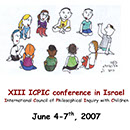 The 13th ICPIC conference entitled “Philosophical Inquiry with Children: A meeting Point Between Cultures and Identities“ offered an interdisciplinary investigation of the connection between philosophical inquiry, identity and culture. The conference was organized by the Israel Center for Philosophy in Education — “Philosophy for Life” together with the Hebrew University. Keynote Speakers were Joel Westheimer and Jane Roland Martin. Conference highlights included educational site visits to schools, a dialogue conducted by Jewish and Palestinian primary school children around the conference theme, and the final cultural party.
The 13th ICPIC conference entitled “Philosophical Inquiry with Children: A meeting Point Between Cultures and Identities“ offered an interdisciplinary investigation of the connection between philosophical inquiry, identity and culture. The conference was organized by the Israel Center for Philosophy in Education — “Philosophy for Life” together with the Hebrew University. Keynote Speakers were Joel Westheimer and Jane Roland Martin. Conference highlights included educational site visits to schools, a dialogue conducted by Jewish and Palestinian primary school children around the conference theme, and the final cultural party.
Coming Soon!
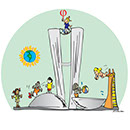 The 9th ICPIC conference entitled “Thirty Years of Philosophy for Children on Debate“ took place in July 1999 at the Convention Center “Ulysses Guimarães” in Brasilia, in the Federal District of Brazil. Around 1,300 people from 30 countries participated in meaningful exchanges looking back on the first three decades of P4wC practices. The University of Brasilia contributed immensely to the organizational effort. During the event, proceedings of the Iceland and Portugal conferences were also shared.
The 9th ICPIC conference entitled “Thirty Years of Philosophy for Children on Debate“ took place in July 1999 at the Convention Center “Ulysses Guimarães” in Brasilia, in the Federal District of Brazil. Around 1,300 people from 30 countries participated in meaningful exchanges looking back on the first three decades of P4wC practices. The University of Brasilia contributed immensely to the organizational effort. During the event, proceedings of the Iceland and Portugal conferences were also shared.
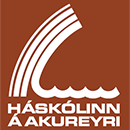 The 8th ICPIC Conference entitled “Philosophy for Children on Top of the World” took place in Akureyri, Iceland, and was hosted by the University of Akureyri. Proceedings were published in a book of the same name, edited by Hreinn Pálsson, Brynhildur Sigurðardóttir and Barbara B. Nelson. The programme covered a variety of topics, such as the sacred-as-relationship in the community of inquiry, participation in a community of inquiry, reconstructing childhood, self-respect, megalopsychia and moral education, and “The Cage” a philosophical project.
The 8th ICPIC Conference entitled “Philosophy for Children on Top of the World” took place in Akureyri, Iceland, and was hosted by the University of Akureyri. Proceedings were published in a book of the same name, edited by Hreinn Pálsson, Brynhildur Sigurðardóttir and Barbara B. Nelson. The programme covered a variety of topics, such as the sacred-as-relationship in the community of inquiry, participation in a community of inquiry, reconstructing childhood, self-respect, megalopsychia and moral education, and “The Cage” a philosophical project.
Coming Soon!
Coming Soon!
Coming Soon!
Coming Soon!
Coming Soon!
OUR
journal
Childhood and Philosophy is a research voice for ICPIC. In keeping with the organization’s lively and diverse character, the journal publishes papers in multiple languages to signify our commitment to increasing capacity among members to work and publish in their mother tongue. We see this as a metaphor of our ability to encompass a variety of perspectives—the basis for rethinking childhood and philosophy.
What do we publish?
Our multilingual journal consists of articles, transcripts, curricula, news, book reviews, project reports and graphics. It is a blind peer-reviewed publication and does not accept previously published submissions. Submissions may be sent electronically on an ongoing basis—we welcome not only scholarly essays and research articles but also reports from the field and lesson plans by philosophers and educators.
OUR
essay award
The Executive Committee of the International Council for Philosophical Inquiry with Children (ICPIC) is pleased to announce the 2021 competition for the ICPIC Biennial Award for Excellence in Interpreting Philosophy for/with Children. Essays must be submitted by 15 September 2021.
Every year theorists and practitioners engaged in the field of philosophical inquiry with young people contribute to the growing body of knowledge that sustains and challenges our work in this field. Exploring the connection between theory and practice, between philosophical practice and life, these scholars help to revitalize the P4wC community worldwide. As with any educational movement, our strength and growth rely on the capacity to report on significant practices, raise questions, seek connections, develop theories, investigate assumptions and assess our pedagogical methods. Our essay award is one way to do so…
For more information, contact re******@ic***.org
The ICPIC Award of Excellence in Interpreting
Philosophy for/with Children
Since 2002, ICPIC offers an award of US $200 to the best submission of our essay competition, which aims to encourage emerging scholars to articulate fresh visions of the nature and significance of Philosophy for/with Children, and recognize their efforts in this regard:
✓ The winning author will receive $200 USD.
✓ The author will be invited to present the essay at a special session of the 2021 ICPIC Biennial Conference in Japan, where a member of the award committee will also offer commentary. (Attendance at the conference is highly encouraged but not required to participate in the essay competition.)
✓ ICPIC will pay the author’s conference registration fee (unless paid by the author’s employer/institution).
✓ The winning essay will be published in the ICPIC journal Childhood and Philosophy, where it will be noted that the essay won the award.
LAST
winner
undefinedundefinedundefinedundefinedundefinedundefinedundefinedundefined


